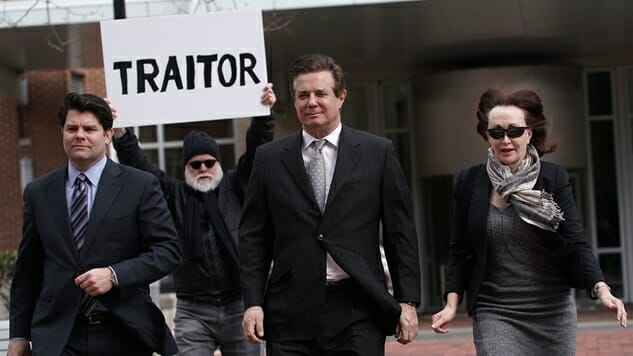Robert Mueller: Trump’s Campaign Manager Was in Contact with Russian Military Intelligence During the Campaign
Photo by Alex Wong/Getty Politics Features Paul Manafort
Vladimir Putin famously said that “there are no former intelligence officers,” and that is likely the case here. Before we get to informed speculation, let’s lay out the hard facts. Robert Mueller’s special counsel filed new court documents last night in United States v. Alex Van Der Zwaan. Van der Zwaan is the son-in-law of a prominent Russian Ukranian banker, and he practices law in London. Van der Zwaan pleaded guilty last month to lying about his September 2016 contacts with Trump campaign chairman Paul Manafort, Manafort’s deputy, Rick Gates, and someone simply referred to as “Person A.”
Fourth, the lies and withholding of documents were material to the Special Counsel’s Office’s investigation. That Gates and Person A were directly communicating in September and October 2016 was pertinent to the investigation. Federal Bureau of Investigation Special Agents assisting the Special Counsel’s Office assess that Person A has ties to a Russian intelligence service and had such ties in 2016. During his first interview with the Special Counsel’s Office, van der Zwaan admitted that he knew of that connection, stating that Gates told him Person A was a former Russian Intelligence Officer with the GRU.
Anyone who has followed this Russia investigation in detail immediately had one name spring to mind after reading this charge by Mueller: Konstantin Kilimnik. Manafort spokesman Jason Maloni has called Kilimnik a “longtime business associate.” Politico summarized Kilimnik’s backstory in a report about Manafort associates being concerned about his “Man in Kiev” during the 2016 campaign.
A Russian Army-trained linguist who has told a previous employer of a background with Russian intelligence, Kilimnik started working for Manafort in 2005 when Manafort was representing Ukrainian oligarch Rinat Akhmetov, a gig that morphed into a long-term contract with Viktor Yanukovych, the Kremlin-aligned hard-liner who became president of Ukraine.
Kilimnik eventually became “Manafort’s Manafort” in Kiev, and he continued to lead Manafort’s office there after Yanukovych fled the country for Russia in 2014, according to Ukrainian business records and interviews with several political operatives who have worked in Ukraine’s capital. Kilimnik and Manafort then teamed up to help promote Opposition Bloc, which rose from the ashes of Yanukovych’s regime. The party is funded by oligarchs who previously backed Yanukovych, including at least one who the Ukrainian operatives say is close to both Kilimnik and Manafort.
Politico spoke to Kilimnik’s contemporaries and found that it was an open secret that Manafort’s man handling his affairs in Ukraine was trained by the Kremlin.
Kilimnik did not hide his military past from his new employer. In fact, when he was asked how he learned to speak such fluent English, he responded “Russian military intelligence,” according to one IRI official, who quipped, “I never called [the Russian military intelligence agency] GRU headquarters for a reference.”
It soon became an article of faith in IRI circles that Kilimnik had been in the intelligence service, according to five people who worked in and around the group in Moscow, who said Kilimnik never sought to correct that impression.
“It was like ‘Kostya, the guy from the GRU’ — that’s how we talked about him,” said a political operative who worked in Moscow at the time. “The institute was informed that he was GRU, but it didn’t matter at the time because they weren’t doing anything sensitive.”
The Atlantic obtained e-mails exchanged during the campaign between Manafort and Kilimnik. They spoke about “OVD,” which is short for Oleg Deripaska, a Russian oligarch whom Manafort had worked closely with for years on a $10 million annual contract (Deripaska also requested immunity from Congressional investigators to testify about Russian meddling in the 2016 election).
In 2005, Manafort wrote a memo to Deripaska, pitching his plan: “We are now of the belief that this model can greatly benefit the Putin Government if employed at the correct levels with the appropriate commitment to success.” Manafort asserted that the effort he proposed “will be offering a great service that can re-focus, both internally and externally, the policies of the Putin government.”
So fast-forward to April 11, 2016—two weeks after Manafort was named Trump’s campaign manager—and leaked e-mails published by The Atlantic indicate that Manafort was still very much working for his former boss.
“I assume you have shown our friends my media coverage, right?” Manafort wrote.
“Absolutely,” Kilimnik responded a few hours later from Kiev. “Every article.”
“How do we use to get whole,” Manafort asks. “Has OVD operation seen?”
The “get whole” reference seems to be asking about resolving debts, which may be linked to Deripaska’s 2009 lawsuit against Manafort, alleging that the future Trump campaign manager stole $19 million from him. The Washington Post also reported that Kilimnik and Manafort discussed the DNC hack in August 2016. There’s enough smoke here for a ten-alarm fire. Not to mention, Manafort isn’t the only high-level member of the Trump camp connected to Russian military intelligence this week. Roger Stone admitted that he spoke to Guccifer 2.0 during the 2016 campaign, and the Twitter account was just revealed to be a front for the Kremlin.
Again, there’s no confirmation in this document that Person A is Konstantin Kilimnik, but we knew before this court filing that one of Manafort’s most trusted men was openly known as a GRU spook. If Person A isn’t Kilimnik, then Manafort may be in bigger trouble than it already seems. At minimum, Manafort leaned on a Russian military intelligence veteran to manage his deals which were financed by a Putin ally in a country invaded by Russia, and continued that relationship while he sat atop the Trump campaign. This is the context to which he entered Trump’s universe.
Jacob Weindling is a staff writer for Paste politics. Follow him on Twitter at @Jakeweindling.